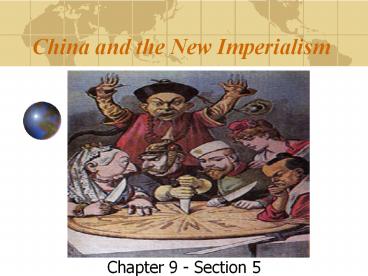China and the New Imperialism - PowerPoint PPT Presentation
Title:
China and the New Imperialism
Description:
China and the New Imperialism Chapter 9 - Section 5 Key Terms balance of trade trade surplus trade deficit Opium War indemnity extraterritoriality Taiping Rebellion ... – PowerPoint PPT presentation
Number of Views:339
Avg rating:3.0/5.0
Title: China and the New Imperialism
1
China and the New Imperialism
- Chapter 9 - Section 5
2
Key Terms
- balance of trade
- trade surplus
- trade deficit
- Opium War
- indemnity
- extraterritoriality
- Taiping Rebellion
- Sino-Japanese War
- Open Door Policy
- Guang XU
- Boxer Uprising
- Sun Yixian
3
The Opium War
4
The Opium War
- During the late 1700s, British merchants made
huge profits by trading opium grown in India for
Chinese tea. - Soon, many Chinese became addicted to opium.
- Silver flowed out of China, causing the Economy
to fail. - The Chinese government outlawed opium and
executed drug dealers. - Britain refused to stop, insisting on the right
to free trade. - In 1839, Chinese warships clashed with British
merchants, triggering the Opium War. - British gunboats, equipped with the latest in
firepower, crushed Chinas coast, and easily
defeated the Chinese.
5
The Treaty of Nanjing
- In 1842, Britain made China accept the Treaty of
Nanjing. - Britain received a huge indemnity, or payment for
losses costs in the war. - The British also gained the island of Hong Kong.
- China had to open five ports to foreign trade and
grant British citizens in China
extraterritoriality, the right to live under
their own laws and be tried in their own courts. - The treaty was a series of unequal treaties
that forced China to make concessions to Western
powers
6
The Taiping Rebellion
7
The Taiping Rebellion
- The Taiping Rebellion lasted from 1850 to 1864,
was probably the most devastating peasant revolt
in history. - By the 1800s, the Qing Dynasty was in decline due
to poor
irrigation systems, canals, flooding, and the
population explosion. - An extravagant imperial court, tax evasion by the
rich, and official
corruption added to the peasants burden. - Poverty and misery increased causing peasants to
revolt. - Hong Xiuquan lead the revolt, and called for an
end to the hated Qing Dynasty.
- The Taiping rebels won control of large parts of
China for over 14 years,
before the government crushed them. - The Taiping rebellion almost toppled the Qing
Dynasty. - It is estimated that 20 to 30 million Chinese
died during the rebellion. - The Qing government survived, but had to share
power with regional commanders, and
Russia seized lands in the north.
8
Launching Reform Acts
- Many Chinese scholar-officials disapproved of
Western ideas since it challenged the Confucian
order. - In the late 1860s, reformers launched the
self-strengthening movement which imported
the latest Western technology to build factories
and modern weapons. - The movement made only limited progress because
the government did not rally behind it. - Japan rapidly modernized and took control of the
island of Taiwan from China during the
Sino-Japanese War. - Open Door Policy allowed all nations to openly
trade in China. The United States feared
European power in China. No Chinese were ever
consulted. - Hundred Days of Reform was launched by Guang Xu,
a young emperor in 1898. New laws set out to
modernize China. Conservatives soon rallied
agianst the reform and Xu was imprisoned. Ci Xi,
the aging empress reasserted control. All
reformers fled!
9
The Boxer Uprising
10
The Boxer Uprising
- What led to the Boxer Uprising?
- Who were the Chinese secret society?
- Why were they called Boxers?
- What was the goal of the Boxers?
- What happened in the Boxer Uprising?
- What was the aftermath of the Boxer rebellion?
11
Three Principles of the People
- Sun Yixian, a passionate spokesman for a Chinese
Republic, organized the Revolutionary Alliance to
rebuild China on Three Principles of the People - 1. Nationalism, freeing China from foreign
domination. - 2. Democracy, or representative government.
- 3. Livelihood, or economic security for all
Chinese. - Birth of a republic began when Ci Xi died in 1908
and a two-year-old boy inherited the throne. - China slipped into chaos, and in 1911, uprisings
spread to man provinces. - Peasants, students, local warlords helped topple
the Qing Dynasty. - December 1911, Sun Yixian was named president of
the new Chinese republic.

